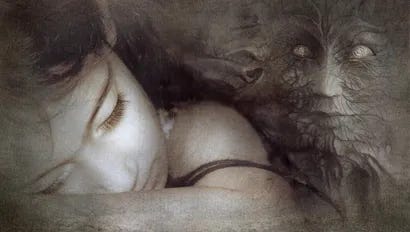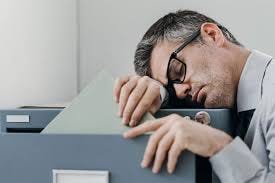The Confessions of a Narcolepsy Experiencer
The little-known sleep disorder with episodes of sleep paralysis
Have you ever found yourself nodding off during a meeting or struggling to keep your eyes open during a movie? We all have those moments, but imagine if that drowsiness was your constant companion. While many of us have this once in a while, for some, it's a doorway to a world less understood.
Today, I'm unveiling a podcast episode that bridges the gap between the scientific and the supernatural. It's both heart-wrenching and enlightening. Straight from the New England Journal of Medicine: "Awakened Hope for Narcolepsy — ITT Episode 17" for a journey that's as mystical as it is medical.
Dr. Emmanuel Mignot from Stanford sheds light on the science of narcolepsy, but there's more. Included in the stories of those battling this condition are whispers of the paranormal. Could there be a deeper, otherworldly connection to this sleep disorder?
Let's explore the crossroads of narcolepsy and the paranormal. This is one story where science meets the spirits.
Ebony Lay: My name is Ebony Lay. I am 41 years old, and I was diagnosed with narcolepsy with cataplexy (the sudden loss of muscle tone while a person is awake) at age 32. It was a very rough, long road for me. I couldn’t remember a time when I wasn’t sleepy. Growing up as a little kid, it was almost like a personality quirk of mine. Whenever I would have these periods of high emotion, I would just lose all muscle control. I would fall, or every muscle my face would drop, and my dad would call it “making faces”. I would have these super-vivid dreams that would feel like I was awake, and I would just be hearing or seeing these distressing things, but I wouldn’t be able to move. I couldn’t speak. I couldn’t scream. I was just stuck there, and I’m having no way of doing anything about it.
My mom said that she would catch me laughing and falling over when I was 6 years old. And she would take me to my paediatrician, because she was worried because I would be wanting to sleep all the time, and I would have all of these clumsy accidents. So every now and then she would take me to a paediatrician, and they’d check me over and they’re like, “Oh, no. She’s healthy. This is probably growing pains.” And then, when I became a teenager, then it was, “Maybe she might have depression. So let’s put her on an antidepressant and see if that helps.” Or “She’s sleeping a lot more now,” and then it was, “Well, she’s a teenager, so. . .”
Well, it was really a struggle with my family. Because if they would catch me trying to lay down somewhere they would be like, “If you nap too much, that’s just going to make you feel more tired. You should get up and just walk around.” And then every now and then I would just kind of hit a wall, where even if I was trying to force myself to not nap, I would just not be able to think straight, and stringing two words together felt impossible. And so I would just melt down and just start crying. They would just back away, leave me alone, and then I would be able to fall asleep.
As I got older, I never really talked about the troubles that I had at night with the vivid dreams and the sleep paralysis, because I didn’t know that those things were things that you could tell a doctor. But just the tiredness alone, there was always this veil of fog around me. As the day goes on it would be kind of like this heaviness, like a push to just lay down and sleep. I felt that it was either I was crazy or that people thought I was looking for an excuse not to do things, and so I shouldn’t talk about it anymore. So I felt defeated overall.
I ended up entering the workforce, jumping around a lot of temp jobs. Because I would be a great employee, highly productive and highly detailed and would turn in good work, but I would constantly struggle to get up in the morning and just get out the door. I would stay at that job until they would lose patience with me. And I did that until I was in my mid-20s, where I landed a dream job, where I got trained up from just being like a receptionist. The guy, he saw some potential in me. So he gave me a telecom engineering apprenticeship, and I became a detail engineer in my own right. It gave me the flexibility to work around my sleepiness so that I could put out the work that needed to be done.
In my 30s, it was desperation on my part, because that part that I never talked about, the nighttime sleep paralysis with the terrifying dreams:
I would wake up, be unable to move. And I would just see my front door open, and then this dark intruder’s just bursting into my apartment and is just kind of barreling towards me. Or there would be other times where I might hear something like my sister screaming my name or crying for help. There’s that panic and fear that there’s something horrible that’s going on.
As much as I felt like I needed to sleep, I was dreading it. I didn’t want to sleep. I was just desperate for some kind of solution. So I went to my doctor and was begging her to find something so that I could just sleep through the night undisturbed. And she had an intern with her that day, and it was the intern who actually suggested that I go in for a sleep study. Even before the sleep study, the person who just did the sleep questionnaire, she had just looked at all of my answers and had asked me if I thought that I might have narcolepsy.
When she had asked me that question, I had laughed, because I kind of had the stereotypical view of what narcolepsy was. And I thought that wasn’t possible because if I needed to stay awake, I could force myself to stay awake. And then she kind of explained the symptoms, and that was the first time that there was somebody who understood what I was going through. I got diagnosed with narcolepsy with cataplexy. We developed a treatment plan, which was a combination of medication and scheduled naps. There’s no cure for it, but with the treatment, it was able to help reduce my symptoms. It doesn’t feel like I have to fight to stay awake anymore.
I hope that this transcript has shed some light on what narcolepsy is and the impact that it has on the lives of experiences. The episode has been lightly edited and the link to the full transcript and podcast episode can be found here:- https://www.nejm.org/doi/full/10.1056/NEJMp2308308?query=featured_home
May you enjoy the rest of your week.
With Love and Light
Sheila
Don’t forget, if you liked reading or listening to this, feel free to click the ❤️ or 🔄 button on this post so more people can discover it on Substack







